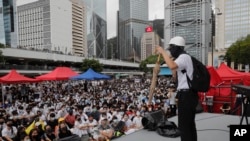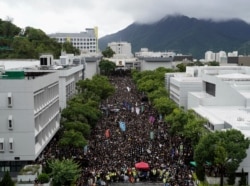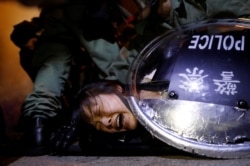Updated: Sept. 2, 2019, 2:25 p.m.
At a university campus and in a park near the government center, tens of thousands of students joined together Monday as they boycotted classes and demanded that the government heed the demands of pro-democracy protesters who have been rallying in the streets for nearly three months.
Organizers said that as many as 10,000 secondary school students skipped classes, and perhaps about half that number rallied near the city's center.
Students dressed in the black garb of the movement, their faces covered with scarves and masks, demanded that the government heed five demands, which include full withdrawal of a maligned bill to allow extraditions to mainland China and an independent investigation of police violence. Some students said that the problems will continue without a complete overhaul of the governing system and the tools for voters to control their officials and stop Beijing's intrusions.
"When you look at the problem, it's the system," said Alex, 22, a recent university graduate dressed head to toe in black. "The point is Beijing. … People will not give up."
As they fight for the city's autonomy, students and other protesters have resorted to increasingly provocative and violent means that have been met with what some say is excessive force from Hong Kong police.
Police said on Monday that 159 people were arrested over the weekend after protesters caused damage in a third of the MTR Corp.'s rail stations.
The city's transport hubs scrambled to get working again Monday after protesters brought the airport to a near standstill Sunday.
Thousands of protesters wearing sanitary masks converged on the international travel hub Sunday, bent on crippling operations. Many were keen to exact revenge after riot police on Saturday stormed some subway stations, beating riders with batons and soaking them with pepper spray while carrying out arrests. Most of those attacked were not arrested.
Most protesters did not gain access to the airport, blocked by a court order after protesters helped to cripple operations there on Aug. 12 and 13. Outside the airport, protesters built barricades from luggage trolleys and metal fencing to stop traffic. Stones and steel bars were thrown onto train tracks.
The government tried to discourage protesters from arriving by shutting down the high-speed rail service that links the airport on one island with major commercial hubs in Kowloon and Hong Kong Island. That sent protesters on an hours-long walk through a partly pastoral landscape, before a huge caravan of drivers arrived to squire them to working transport.
The events followed Saturday's night-long standoffs and battles with police, the fifth anniversary since Beijing denied fully democratic elections in the city without interference.
The government released a statement Saturday that read in part: "Rashly embarking on political reform again will further polarize society, which is an irresponsible act. Any discussions on constitutional development have to be premised on the legal basis, and be conducted under a peaceful atmosphere with mutual trust in a pragmatic manner."







